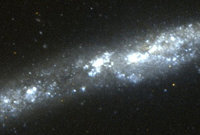No nearby dark matter
By Jason Lisle, Ph.D. *

A new Chilean study has found that there is essentially no "dark matter" in the solar neighborhood. Dark matter is the name of an as-yet-unobserved material whose existence is inferred by its gravitational effects on visible objects. Three independent lines of evidence support the existence of dark matter, so why was it not detected in this study?
The gravitational pull of this unseen material causes stars to orbit the galaxy faster than they would if there were no such material. Also, gravitational macro-lensing (the bending of light as it passes by a galaxy) allows scientists to compute the mass of the galaxy. Such calculations confirm that galaxies contain far more mass than simply their visible components (stars, gas, and dust). Moreover, the motions of galaxies themselves as inferred from their Doppler shifts suggest that dark matter holds together clusters of galaxies.
Current research suggests that dark matter is actually far more abundant in the universe than visible material. So it is somewhat surprising to find that there appears to be no such material in the region of the solar system. Nonetheless, researchers analyzing data from Chile's European Southern Observatory (ESO) have concluded that the motion of stars within 13,000 light years of the sun is consistent with a complete absence of dark matter (and inconsistent with the presence of dark matter). These results are preliminary and, if confirmed, pose a challenge.
One possibility is that dark matter is not the correct explanation for stellar and galactic motions. Perhaps the current understanding of the laws of physics is slightly off.
One of the more popular alternatives to dark matter is a model called Modified Newtonian Dynamics (MOND). This model proposes that the force of gravity is slightly stronger than the standard Newtonian law of gravity (the inverse-square law), particularly in cases of very weak fields. MOND has had some success in accounting for the velocities of stars in spiral galaxies, and it would be consistent with the new research indicating the absence of dark matter in our solar neighborhood. But it is unclear whether MOND accounts for other observations in the cosmos.
Another possibility is that dark matter is distributed differently than astronomers had previously thought. The motion of stars as they revolve around the galaxy is consistent with the presence of dark matter interior to their orbits. But the dark matter would not necessarily have to be abundant in the vicinity of the sun to account for stellar motions around the galaxy. For example, "warm dark matter" (particles with intermediate energy) might explain all the observations. But there is a catch-at least in the secular view. Warm dark matter cannot account for the formation of galaxies after the big bang. Most astronomers search for cold dark matter instead, since they believe it helps gas to collapse into galaxies.
Here, a solution that seems to best fit the data has been largely rejected, not for scientific reasons, but rather on the basis that it does not fit the secularists' belief about origins. It's not that this is wrong. Everyone interprets data in light of his or her worldview. But it shows that secularists are not "neutral" or objective in their approach to science. In the biblical model, there is no reason to believe that galaxies have or can form spontaneously. Therefore, warm dark matter might be a nice explanation for the data.
Also, this research illustrates that many secularists are willing to believe in something that cannot be seen, heard, touched, or detected in any way-they believe in dark matter (perhaps rightly) by faith because it can make sense of that which is visible. And yet many of those same secularists would reject a belief in God on the basis that He cannot be directly observed, despite the fact that the biblical God alone makes sense of the universe and our ability to understand the universe through science. Romans 1:18-20 explains that God has clearly made Himself known to all mankind, and those who reject Him are "without excuse."
Jason Lisle
Institute for Creation Research
Copyright 2012. Reprinted by permission
Subscribe to Pravda.Ru Telegram channel, Facebook, RSS!


